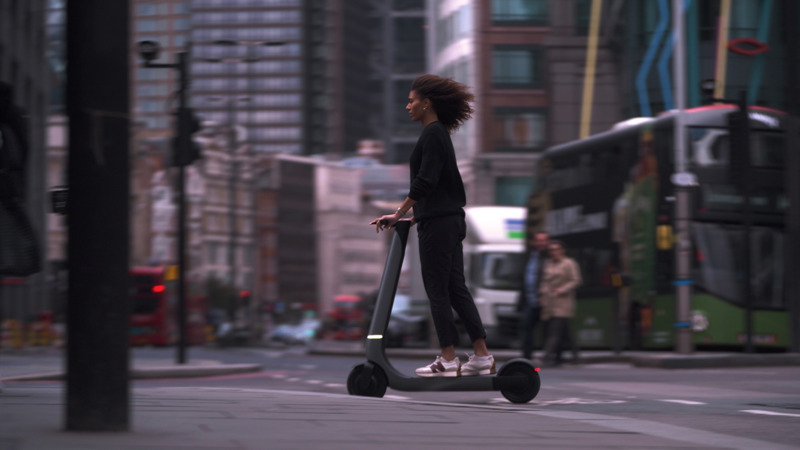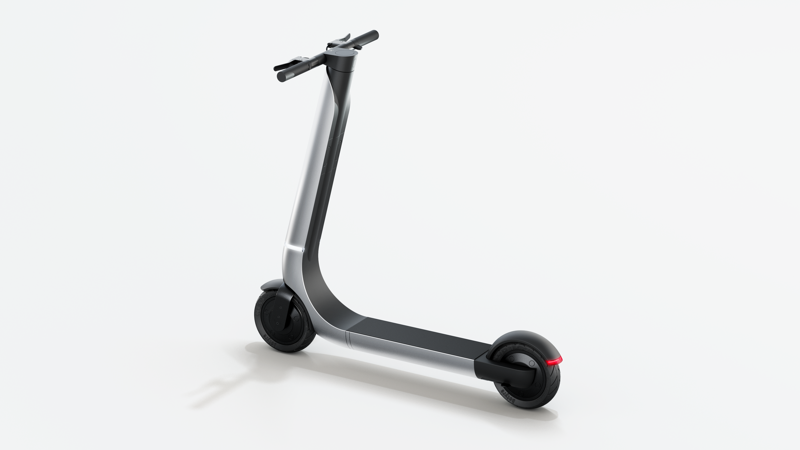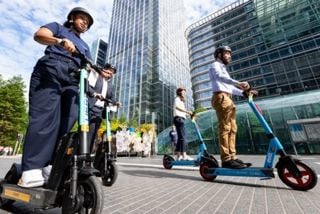 Although e-scooters have some major legislative hurdles to overcome – currently they are illegal to use on public roads outside of the national rental trial – they look set to have a big impact on how people move around in the future.
Although e-scooters have some major legislative hurdles to overcome – currently they are illegal to use on public roads outside of the national rental trial – they look set to have a big impact on how people move around in the future.
Under the trial, which is taking place in 31 areas across England and will run until May 2024, more than 34 million rides – 32.6m of them outside London – have so far happened, says shared mobility charity CoMoUK.
But despite this, the UK is lagging behind most of Western Europe when it comes to legislation and adoption.
“There is an old saying that nothing can stop an idea whose time has come,” says Oscar Morgan (pictured below), CEO of British start-up Bo, which was founded by former Williams F1 Advanced Engineering and Jaguar Land Rover designers and has launched a premium e-scooter.
“The UK is an outlier in that if you go to France, Spain, Germany or Italy, you’ll find they are well ahead of us in integrating e-scooters into the transport system.
“It’s inevitable that we will catch up and will create legislation that enables the take-up of the technology.”
In the Queen’s Speech in May 2022, the Government committed to the legislation of e-scooters in a new Transport Bill, but this been delayed until further notice with no estimated date when it might be announced.
This means they are currently permitted to be used on public roads only if they are hired through the shared scooter trials.
Safety is another concern, with e-scooters tending to hit the national headlines only when there has been an accident or a battery fire.
These are more common on the unregulated e-scooters and not those used as part of the rental trial, but avoiding these issues has been a particular area of focus for Bo.
Its first model – M, which is available to preorder now with deliveries later this year – features a robust structure with its aluminum Monocurve monocoque construction, while its Safesteer technology performs as a dynamic steering stabiliser to aid handling and safety.
It is powered by a 500W electric motor that has a top speed of 21.7mph, and a range of up to 31 miles. The battery can be charged in around three hours on a standard electricity connection.
“When you’re developing cars, you have to take safety seriously because the consequences of it going wrong are so high,” says Morgan.
“We’ve distilled what we were doing with designing cars into this more compact vehicle.
“If you look at the construction of most e-scooters, a lot have effectively come from the toy category because the base of the original ones was someone who took a lightweight lithium-ion powertrain and combined it with a kick scooter.
“Over time there has been a ruggedising of these toys, With Bo, we started with a proper monocoque chassis and then packaged the components of an e-scooter into that.
“So it’s a completely different architecture, a different platform and a different psychology.”
Morgan says this level of engineering and quality is reflected in the higher price of Bo’s e-scooter – at £1,995 it is available to pre-order now, with deliveries later this year – but customers will receive improved safety and reliability, while the vehicle will also have a much longer lifespan.

Fleet opportunities
Once e-scooter legislation has been passed, Morgan sees plenty of opportunities for fleets to incorporate them into their operations as they look to decarbonise, particularly for those organisations in urban areas.
“For me, the really exciting proposition is if, for example, I’m an estate agent,” he adds. “You see the Foxtons Minis all over London. Imagine the benefit, from their point of view, if every single appointment can always be met on time, regardless of traffic, and they never pick up another parking ticket for any of their vehicles.”
E-scooters could also be used to supplement or replace pool cars for employees to use for business trips, if the circumstances are right.
“For the cost of one pool car, you could have 10 or 15 e-scooters.,” says Morgan. “They would occupy less space in terms of the company footprint, less space in terms of the real estate, and the daily costs of running all 10 of those vehicles is going to be less or equivalent to the car.
“Clearly in fleet, the primary focus has to be on the economics, and there I think e-scooters make a really robust argument for themselves there, because the access price is so much lower, the energy cost is so much lower, the storage and parking costs are so much lower.
“One of the great advantages of e-scooters and e-bikes is that they are the most efficient mode of powered transport.
“They use 10-14Wh per kilometre and the most efficient electric car you can buy is around 150Wh per kilometre, so your energy consumption is reduced by a factor of 10 with one move. It’s a massive efficiency win straight out of the box.”
Morgan says for the cost of one pool car, an organisation could have 10 or 15 e-scooters for staff use, and these would take up less space while the costs of running them will be the same or less than for that one vehicle.
“So there’s all these basic economic benefits, alongside the fact that you don’t have to be insuring it to nearly the same extent, licencing and tax will be more beneficial,” he adds.

Employee benefit
“For me, where I get fascinated is when the fleet management aspect meets the employee benefit aspect because if you’re responsible for large numbers of people moving in the city, it’s dramatic how much more enjoyable their journeys become when they’re not sat in a queue, where they have control of their time where they have access to this vehicle,” he adds.
“Everyone is aware of the use cases where a scooter is not appropriate,” he adds.
“We’re not in the business of ‘sell your car, buy an e-scooter’ because people buy a car to visit their mum or to visit a client who may be 100 miles away.
“If it’s torrentially raining, then you’re not going to use one. Same with if you have to carry multiple people or moving boxes.
“But what journeys can we augment? How can we improve the way people are operating? And can we be a bit creative about how good or efficient your operation can be when you have access to e-scooters?




















Login to comment
Comments
No comments have been made yet.